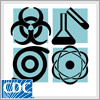COCA Call: New Frontiers in Hand Hygiene Practices
[Announcer] This podcast is presented by the Centers for Disease Control and Prevention. CDC – safer, healthier people.
Hello, I'm Kate Ellingson, an Epidemiologist with CDC's Division of Healthcare Quality Promotion.
Healthcare-associated infections can cause devastating complications for patients, including prolonged hospital stays, long-term disabilities, even death. These infections also pose a threat to our healthcare infrastructure, as they can lead to increased antimicrobial resistance and increased healthcare costs. When performed properly and consistently, hand hygiene is likely the most effective way to prevent transmission of the pathogens that can lead to healthcare-associated infections. Unfortunately, adherence to recommended hand hygiene practices is low; among healthcare workers in the United States, hand hygiene adherence is less than 50 percent.
At CDC, we are committed to improving hand hygiene in healthcare settings by approaching the challenge from multiple angles. We have long promoted training and education for healthcare workers about the importance of hand hygiene and the proper indications for performing hand hygiene. Education and training is necessary, but clearly not sufficient, as hand hygiene adherence rates remain unacceptably low. Improvements in adherence have been made in the past decade with the introduction of alcohol-based hand gel, which compared to soap and water, requires less time, irritates hands less, and makes hand hygiene possible at the patient bedside more often. Even with these improvements though, we can and must, do better.
The CDC guideline for hand hygiene in healthcare settings recommends that hospitals periodically monitor hand hygiene adherence by healthcare personnel and provide feedback to personnel regarding performance. Direct observation of healthcare workers has long been the gold standard for measuring adherence. However, because we lack a standardized approach for observer training and hand hygiene adherence measurement, benchmarking is difficult and the validity of data generated from hand hygiene observations is often questioned by providers.
Motivated by the lack of standardization, in the past year, some exciting innovations in performance measurement have been introduced. For example, the World Health Organization, or W-H-O, has developed and globally disseminated a standardized form for measuring hand hygiene adherence. The form is based on the W-H-O's "5 moments for hand hygiene" which include: before touching a patient, before a clean or aseptic procedure, after body fluid exposure, after touching a patient, and after touching patient surroundings.
The state of Maryland has launched a statewide hand hygiene collaborative, including standardized training for hand hygiene observers that focuses on hand hygiene adherence before and after patient care with centralized data entry. Additionally, on May 5th 2010, the University of Iowa’s Computational Epidemiology Program released iScrub lite, a free iPhone/iPod Touch application. The app was developed in collaboration with CDC and its release coincided with the W-H-O's "Save Lives: Clean Your Hands" annual initiative. iScrub allows an observer to record hand hygiene observations on a handheld device for either the W-H-O's "5 moments" or simply before and after patient contact. Observations can be automatically exported to an Excel spreadsheet for analysis and feedback. You can read more about iScrub on CDC's hand hygiene website: www.cdc.gov/handhygiene. .
The CDC has also embraced patient empowerment in an effort to increase hand hygiene adherence. On the CDC hand hygiene website, under "Patient Materials," you can find a link to a video, which teaches patients and visitors to help prevent infections by practicing hand hygiene while in the hospital, and reminding their healthcare providers to practice hand hygiene, as well. Modeled after the video that airline passengers are required to view prior to take-off on a flight, this video is intended to be shown to patients upon admission to the hospital.
We encourage you to visit the CDC website and learn what you can do. Again, it's www.cdc.gov/handhygiene. Whether you are a patient, a family-member, healthcare worker, or a CEO of a hospital, everyone has a role to play in making patients safer. Thank you.
[Announcer] For the most accurate health information, visit www.cdc.gov or call 1-800-CDC-INFO, 24/7.



